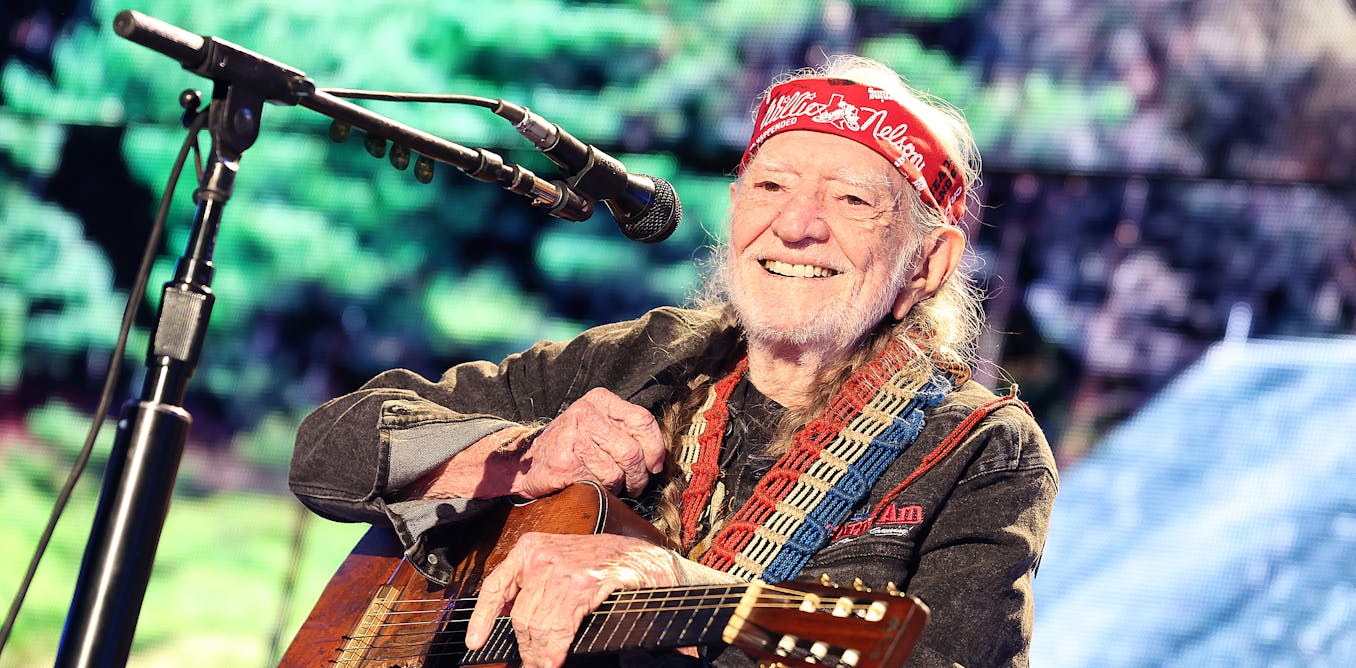
WILLIE NELSON: THE OUTLAW WHO REWROTE COUNTRY MUSIC HISTORY
In a small Texas town during the depths of the Great Depression, a boy named Willie Nelson was born in 1933. Raised in the dusty plains of Abbott, Texas, during a time of widespread despair and uncertainty, few could have predicted that this boy would go on to redefine country music — not just as an artist, but as a rebel, a cultural icon, and a voice for generations.
Willie’s life has been a long, winding road through heartbreak, rejection, success, reinvention, activism, and enduring love for the music and the people it speaks to. His journey is as layered and authentic as the songs he sings.
THE ROAD TO NOWHERE… AND BACK
After serving in the Air Force, a young Willie tried to carve out a music career in Nashville in the 1960s. He recorded several albums with RCA but found little success. His sound was too raw, his phrasing too unconventional, and his image too plain for the polished machine of the Nashville establishment. At one point, he quit music entirely — selling encyclopedias, vacuum cleaners, and facing years of rejection.
But it was songwriting that gave him a foothold. He penned “Crazy” for Patsy Cline, among other hits for other artists. Still, he yearned to be more than just a ghostwriter behind the curtain. He wanted to be heard.
TEXAS REDEMPTION & THE BIRTH OF AN OUTLAW
In the early 1970s, Willie did something radical: he left Nashville and returned to Texas. There, in Austin’s open-minded music scene, among long-haired hippies and roughneck cowboys, he finally found his tribe. The buttoned-up suits were gone. The hair grew long. The music got real.
He wasn’t alone. Artists like Waylon Jennings, Kris Kristofferson, and Johnny Cash joined him in pushing back against the restrictive Nashville formula. Together, they ignited what would be known as Outlaw Country — a sound rooted in blues, honky-tonk, folk, and truth.
With albums like Phases and Stages and the groundbreaking Red Headed Stranger, Nelson pioneered the concept album in country music — telling emotional, narrative-driven stories that were more than just singles. Red Headed Stranger became a defining work, filled with raw instrumentation and aching lyricism.
A VOICE UNLIKE ANY OTHER
Willie Nelson’s voice is instantly recognizable — slightly behind the beat, gentle, soulful, honest. Influenced by Frank Sinatra’s phrasing and Django Reinhardt’s guitar playing, Willie developed a style that no one could replicate. His guitar, “Trigger,” with its gaping hole worn from decades of playing, became an extension of his soul.
As one commentator put it, “When Willie Nelson sings, you believe him.” Whether it’s “Always on My Mind” or “Funny How Time Slips Away,” his delivery cuts through the noise. He doesn’t sing to impress — he sings to feel.
A CROSSOVER STAR & AMERICAN ICON
By the 1980s, Nelson became a mainstream success. With the film Honeysuckle Rose and its iconic theme song “On the Road Again,” he transcended country music and entered American pop culture. The song became a symbol of freedom, wanderlust, and resilience.
His 1982 recording of “Always On My Mind” became a global hit, showcasing his unmatched ability to revive and reframe a song with deep emotional weight. His duet album with Merle Haggard, Pancho and Lefty, added another classic to the canon.
Then came Stardust, a breathtaking album of American standards that shocked critics and thrilled fans, selling over 10 million copies. Willie could sing country, jazz, gospel, and blues — and he did it all his way.
SCANDALS, TAXES, AND TACO BELL
In the late 1980s, Nelson found himself in hot water with the IRS, owing over $30 million in back taxes. But instead of sinking into shame, he leaned into his outlaw image, recording new material, selling assets, and even doing a Taco Bell commercial to help pay off the debt. And the public? They stood by him.
Because Willie Nelson wasn’t just a celebrity. He was one of us.
A LEGACY OF TRUTH, ACTIVISM, AND MUSIC
Through it all, Willie used his fame for good. He founded Farm Aid to support struggling farmers. He advocated for marijuana legalization long before it was trendy. He spoke out for the environment, LGBTQ+ rights, and renewable energy. He stood up, again and again, for the underdog — because that’s who he had been.
His music remained constant. Decade after decade, he toured in his bus, sang the songs fans loved, and never lost his rebel spirit.
WHAT WILLIE LEAVES BEHIND
Now in his 90s, Willie Nelson remains an American treasure. Whether it’s the stories he’s told, the causes he’s championed, or the millions of hearts he’s touched, his impact is immeasurable.
He broke the rules, but he never broke faith with the music.
As one fan said, “Willie doesn’t just sing songs. He sings our stories.”
And in doing so, he became something larger than country music — he became a voice for sincerity, survival, and soul.